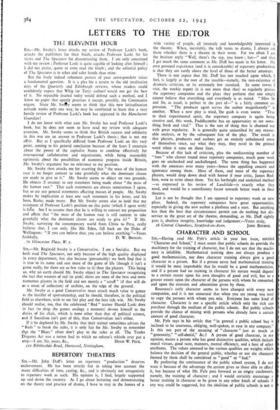REPERTORY THEATRES
SIR.—Mr. John Duff's letter on repertory " production " deserves endorsement. He has been strictly fair in taking into account the many difficulties of time, casting, &c., and is obviously not antagonistic to repertory work as such. His opinion is, I find, largely supported up and down the country. As I go about lecturing and demonstrating on the theory and practice of drama, I have to stay in the homes of a
wide variety of people, all intensely and knowledgeably interested in the theatre. When, inevitably, the talk turns to drama, I always ask them whether there is a theatre in their town. Far too often I get the hesitant reply " Well, there's the rep, you know ; but—" and then I get much the same comment as Mr. Duff has made in his letter. My own personal experience (and it is considerable) of repertory productions is that they are rarely above the level of those of the better amateurs.
There is one aspect that Mr. Duff has not touched upon which, I feel, is largely at the root of the trouble—namely, the non-existence of dramatic criticism, or its extremely low standard. In some towns I visit, the weekly report (it is not more than 'that) so regularly praises the repertory companies and the plays they perform that one simply cannot believe that everything and everybody is as stated. " Miss So and So, as usual, is perfect in the part of—" is a fairly common ex- pression. " The producer again serves the author magnificently " is another. When a new play is tried, The gush is even worse. "True to their experimental spirit, the repertory company is again being creative and, this week, Puddlecombe has an opportunity to see some- thing fresh and vital." That is the sort of thing that is churned out with great regularity. It is generally quite unjustified by any reason- able analysis, or by the subsequent fate of the play. The result is • that players, producers and authors get an entirely unbalanced sense of themselves since, say what they may, they revel in the printed word when it runs on those lines.
Because of this lack of criticism, plus the undiscerning number of " fans " who cluster round most repertory companies, much poor work goes on unchecked and unchallenged. The same thing has happened with the amateurs over many years—hence the appalling conceit and ignorance among them. Most of them, and most of the repertory players, would drop down dead with horror if your critic, James Red- fern, were to write about them. Yet his forthright and analytical method —as expretsed in his review of Landslide—is exactly what they need, and would be a contributory factor towards better work in their theatres.
Let it not be thought that I am opposed to repertory work or new plays. Indeed, the repertory companies have great opportunities, especially in giving the new author a platform and a start. But anything less than the best that circumstances permit can do nothing but dis- service to the great art of the theatre, demanding, as Mr. Duff rightly puts it, absolute integrity, knowledge and judgement.—Yours truly,
r6 Central Chambers, Stratford-on-Avon. • JOHN BOURNE.


























 Previous page
Previous page